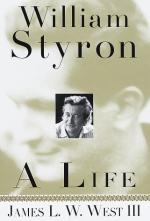|
This section contains 214 words (approx. 1 page at 300 words per page) |
The novels of William Styron have won major literary awards, received tremendous popular attention, and been the subject of controversy. Styron's two best known novels, The Confessions of Nat Turner (1967) and Sophie's Choice (1979), deal respectively with an American slave rebellion and the holocaust. The Confessions of Nat Turner, based on a documented revolt by slaves in Virginia's Tidewater area in 1831, won the Pulitzer Prize, yet sparked much hostile criticism from black writers and critics. Many charged Styron with historical falsification while others believed it was unconscionable for a white novelist to presume to enter the mind of a black slave. Sophie's Choice, set in post-World War II Brooklyn, is the story of an Auschwitz survivor who is plagued by horrible memories and caught in a turbulent love relationship. Styron has also chronicled his battle with depression in a memoir, Darkness Visible (1992).
Further Reading:
Casciato, Arthur D., and James L. W. West III, editors. Critical Essays on William Styron. Boston, G. K. Hall, 1982.
Clarke, John Henrik, editor. William Styron's Nat Turner: Ten Black Writers Respond. Boston, Beacon Press, 1968.
Coale, Samuel Chase. William Styron Revisited. Boston, Twayne, 1991.
West, James L. W. III, editor. Conversations with William Styron. Jackson, University Press of Mississippi, 1985.
——. William Styron: A Life. New York, Random House, 1998.
|
This section contains 214 words (approx. 1 page at 300 words per page) |


